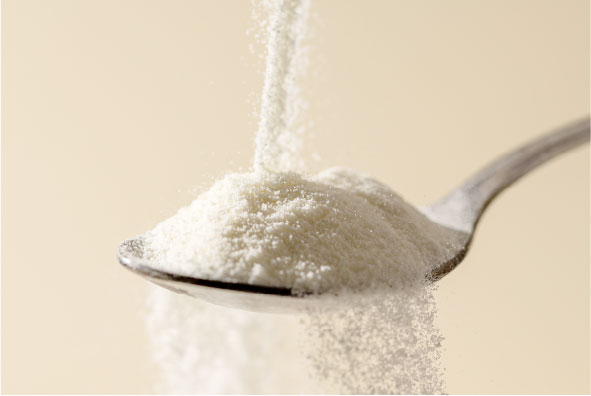THE PROPERTIES AND BENEFITS IN HUMAN BODY

Containing up to 70% of water the body of an average adult relies as well on the second most crucial components such as proteins which add up to 20%.
More than one third of the human proteins are consisting out of collagens, a very important structural component representing connective tissue in its purest form providing a vital ingredient for supporting health and beauty.
With approx. 50% of collagen amino acids contained in human collagen being either proline, hydroxyproline or glycine such amino acids represent ca. 15% of the total human amino acid composition.
Collagen peptides, consisting out of Type I (ca.95%) as well as Type III (ca. 2 – 3%) avail of sustainable physiological benefits as they stimulate natural body functions.
Multiple studies confirm that the bioactive effects supported by collagen peptides are linked to the consumption of water soluble Collagen = Collagen Peptides.

After ingestion, the distribution to the connective tissue of the body through the intestinal wall is performed within a short time due to the relatively low average molecular weight (2000 – 5000 Daltons) of the collagen peptides. Hence the processes of production of collagen peptides are decisive for the specification of biodegradability, biocompatibility and low immunogenicity.
Scientifically and newly evidenced reasons for using premium collagen peptides in food, nutraceutical and cosmetoceutical products.
The predominance of glycine, proline and hydroxyproline, which represent approximately 40% of the total amino- acid content in CollaSel Collagen Peptides are making the products unique since glycine and proline concentration is 10 to 20 times higher than in other protein products.
BEAUTIFUL SKIN ON THE OUTSIDE IS CONNECTED WITH A
HEALTHY BASE ON THE INSIDE.

Comprehensive understanding of this, paired with aging populations as well as an increased perception for beautiful skin without invasive treatments is currently driving the global nutricosmetic markets.
Smooth, firm and young-looking skin requires optimum levels of wellorganized collagen fibers to ensure skin retaining its elasticity, firmness and moisture-binding capacity.
Aged skin by the years as well as by exposure to sun shows significant levels of impaired and partially fragmented collagen in the dermis.
Presence of fragmented collagen can inhibit collagen synthesis and elastin production, leading to loss of skin elasticity in combination with a reduction in total collagen density.
Such degree of collagen fragmentation can be assessed by confocal laser image technology which provides evidence of the collagen re-structuring process in the deeper layers of the skin.
Fragmentation of Collagen initiates at the age of 30s and particularly increases after menopause (2% per year). Numerous studies give proof of significantly increased skin elasticity after oral application of specific collagen peptides.
Up to 30% of Wrinkle reduction can be achieved by sufficient increase in pro-collagen concentration.

WHY IS HYDROLYZED COLLAGEN PEPTIDE IMPORTANT?
According to studies, more than 90% of peptides are digested and absorbed within several hours after consumption. Such quick absorption ensures that the peptides and amino acids essential for the body reach to their place of duty effectively.
Collagen peptides support the amino acids required by our body and regenerate the tissues in the skin, bone and joints. Besides, they improve intracellular communication, ensure synthesis and regulation of collagen fibers and thereby strengthen tissue structures.

Collagen is the main protein of binding tissues in the human body. It is the most abundant protein and is the glue that holds our tissue together, ensuring integrity, elasticity, and regeneration of our skin, joints, and bones. At 20s, collagen production in the body peaks up. As we grow older, our bodies begin to produce less collagen, leading to the weakening of the collagen fibers in binding tissues in time. Decrease in collagen levels causes different effects on different parts of our body.
-
Skin
As the activity of skin cells decreases, the collagen net that makes the skin tight and protects its structure starts to break down. Skin becomes dehydrated and thinner, and the signs of aging start to appear.
-
Joints
Low collagen level caused by aging ends in functional loss in joint and cartilage.
-
Bones
Bone cycle starts to get unbalanced. In other words, the number of bone structures lost outruns the ones produced. Our bones get weaker and gradually become more fragile, leading to risk of injury.
-
Muscles
The loss of collagen by aging leads to a gradual loss of muscle mass and strength, which affects our balance, gait, and overall mobility.
Bioavailability Revealed: How Collagen Peptides Fuel
Efficient Daily Nutrient Delivery?
FACT 1
ESSENTIAL AMINO ACIDS
Must be consumed in daily diets since the human body is not in a position to synthesize such on it own.
FACT 2
CONDITIONALLY ESSENTIAL AMINO ACIDS
Are non-essential amino acids which can’t be synthesized by the human body in sufficient amounts in specific situations such as:
▷ More mature life stage in which nutrient absorption is slower due to more restricted metabolism abilities.
▷ Recovering from intensive work or sports activities.
▷ Recovering from diseases or injuries.
▷ Enduring stressful situations.
FACT 3
BIOAVAILABILITY
According to studies, more than 90% of specific collagen peptides are digested and absorbed within several hours after consumption. Such quick absorption ensures that the peptides and amino acids essential for the body reach to their place of duty effectively.
HYDROLYZED COLLAGEN PEPTIDES
Solidifies the joints.
Renews the cartilages.
Increases bone intensity.
Enforces muscles.
Tightens the skin, increases elasticity.
Strengthens hair due to creation of keratin.
Enforces teeth and nails.
It can be used as food supplement as well as in cosmetic products.


